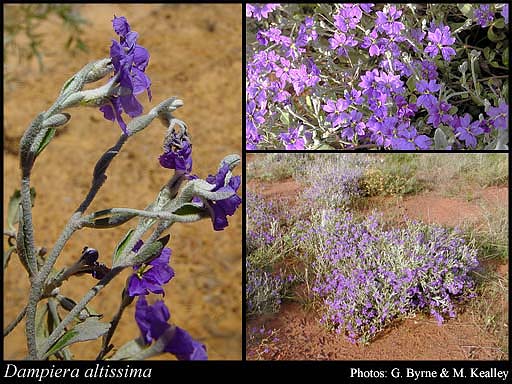- Reference
- Fl.Austral. 4:113-114 (1868)
- Conservation Code
- Not threatened
- Naturalised Status
- Native to Western Australia
- Name Status
- Current
Decumbent to ascending, woody perennial, herb, 0.1-0.5 m high. Fl. blue/purple-blue, Jun to Oct. Sand, laterite, rocky loam. Sandplains, rocky hills, sandstone cliffs.

Scientific Description
Stems ribbed. Leaves flat, 8-60 mm long, 3-18 mm wide, Indumentum present, with dense, stellate hairs; margins entire or toothed. Bracteoles present, 4.5-5.5 mm long, hairy. Pedicel pedicellate, Pedicel length the pedicels 3 mm long, Indumentum present, Hair type with simple hairs. Calyx lobes present, Calyx length 1-2 mm long, hairy, with dense, simple hairs. Corolla blue or mauve, 8-15 mm long, auriculate, not spurred, hairy on the outside, with dense, simple hairs, hairy on the inside; central lobes 4-10 mm long, with wings; outer lobes 5.5-12 mm long, wing present on both sides and clearly unequal, 1.2 mm wide on the narrower side, 3.2-4 mm wide on the broader side. Anthers connate. Ovary inferior, not gibbose; style 4-4.5 mm long, glabrous; indusium single, glabrous; ovules one or two. Flowers in June, July, August, September and October. Occurs in the Carnarvon (CAR) and Geraldton Sandplains (GS) IBRA Region(s), of the Eremaean (E) and South West (SW) Botanical Province.
Distribution
- IBRA Regions
- Avon Wheatbelt, Carnarvon, Geraldton Sandplains, Yalgoo.
- IBRA Subregions
- Edel, Geraldton Hills, Katanning, Lesueur Sandplain, Wooramel.
- IMCRA Regions
- Central West Coast, Zuytdorp.
- Local Government Areas (LGAs)
- Chapman Valley, Greater Geraldton, Northampton, Shark Bay, Three Springs, Toodyay.